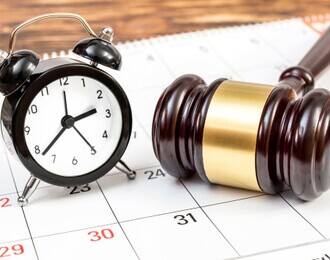
One of the first questions posed to any personal injury lawyer is usually “when will my trial take place?” This question invokes a number of factors including the complexity of the case, whether a settlement is an option, and the court’s docket schedule. However, there are a few important points to keep in mind when planning for personal injury litigation, which should help you gain an understanding of the process and a typical personal injury case timeline.
The Court’s Schedule
The schedule of the court is the over-arching factor to consider when calculating how long it will take to get to trial. Assuming you and your personal injury attorney do not decide to settle the case prior to trial, the court must fit in a scheduling conference, motion hearings and the trial. If the docket is already full, you might be waiting more than a year to reach trial. If the docket is not particularly crowded, you may only have to wait a matter of months.
Complexity of the Case
If your personal injury case is fairly straightforward with little factual background, this could help in achieving a resolution quickly and efficiently. However, many personal injury cases invoke complex issues requiring depositions, extensive discovery, and the involvement of experts. The more complicated the litigation, the longer it will take to resolve.
Notice
Regardless of the length of time your case takes, you will receive notice of your trial date, time and location. Be prepared for your case to be delayed, however, as some cases are continued to future dates to allow for longer preparation periods. Your personal injury attorney will explain this entire process to you.
Timing is everything. Contact or give us a call at (843) 667.0400 for a free consultation.

